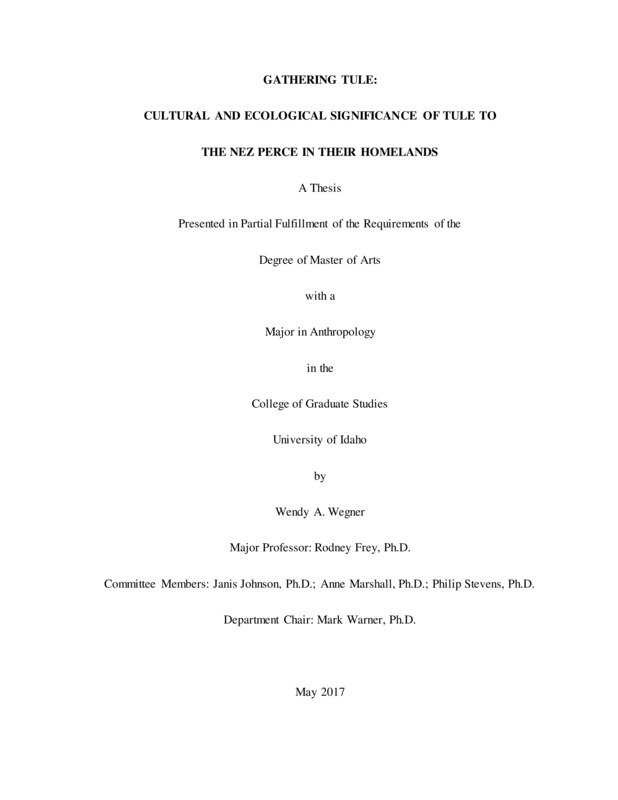GATHERING TULE: CULTURAL AND ECOLOGICAL SIGNIFICANCE OF TULE TO THE NEZ PERCE IN THEIR HOMELANDS
Wegner, Wendy Ann. (2017). GATHERING TULE: CULTURAL AND ECOLOGICAL SIGNIFICANCE OF TULE TO THE NEZ PERCE IN THEIR HOMELANDS. Theses and Dissertations Collection, University of Idaho Library Digital Collections. https://www.lib.uidaho.edu/digital/etd/items/wegner_idaho_0089n_11146.html
- Title:
- GATHERING TULE: CULTURAL AND ECOLOGICAL SIGNIFICANCE OF TULE TO THE NEZ PERCE IN THEIR HOMELANDS
- Author:
- Wegner, Wendy Ann
- Date:
- 2017
- Keywords:
- bulrush indigenous methods mat Nez Perce Nimiipuu tule
- Program:
- Anthropology
- Subject Category:
- Native American studies
- Abstract:
-
Gathering tule is an exploration of Nez Perce life, rooted in the landscape, from Creation to contemporary times. Methods and instructions are passed from generation to generation through story to guide the People as they engage with the land. Over time, the land has been fractionated and wetlands where tule grows have been manipulated by policies that prioritize commerce over protection. These wetlands are the kidneys of the system and the loss of them means a loss of traditional practices for the Nez Perce People, as though a part of the body is missing.
This master’s thesis is an exploration of the place that is the Nez Perce Homelands, by travelling the land and engaging with the People. Rapid Assessment Methods, helped to determine where wetlands exist and should exist throughout the landscape. Engaging with material culture, such as tule and cattail mats, flat bags from dogbane, and other objects, as they are living, tells the story of skill and connection to ecosystems. These “objects” seem like utilitarian in nature, but a closer look reveals layers of story and social life. Listening to stories from Nez Perce People and those connected to plants and the community highlights the methodology that has existed since time immemorial. Language brings life and movement as the words are descriptions of physical attributes of the land, people and material. All of these are connected and not separate ideas that should be considered as a whole, putting Western linear thinking to the side and following Indigenous Methods, incorporating respect, reciprocity, relevance, and reliability. There is much to learn when we listen and conduct research with and not “on” Indigenous Peoples, who have instructions for all of us to live a more sustainable life.
- Description:
- masters, M.A., Anthropology -- University of Idaho - College of Graduate Studies, 2017
- Major Professor:
- Frey, Rodney
- Committee:
- Johnson, Janis; Marshall, Anne; Stevens, Philip
- Defense Date:
- 2017
- Identifier:
- Wegner_idaho_0089N_11146
- Type:
- Text
- Format Original:
- Format:
- application/pdf
- Rights:
- In Copyright - Educational Use Permitted. For more information, please contact University of Idaho Library Special Collections and Archives Department at libspec@uidaho.edu.
- Standardized Rights:
- http://rightsstatements.org/vocab/InC-EDU/1.0/

